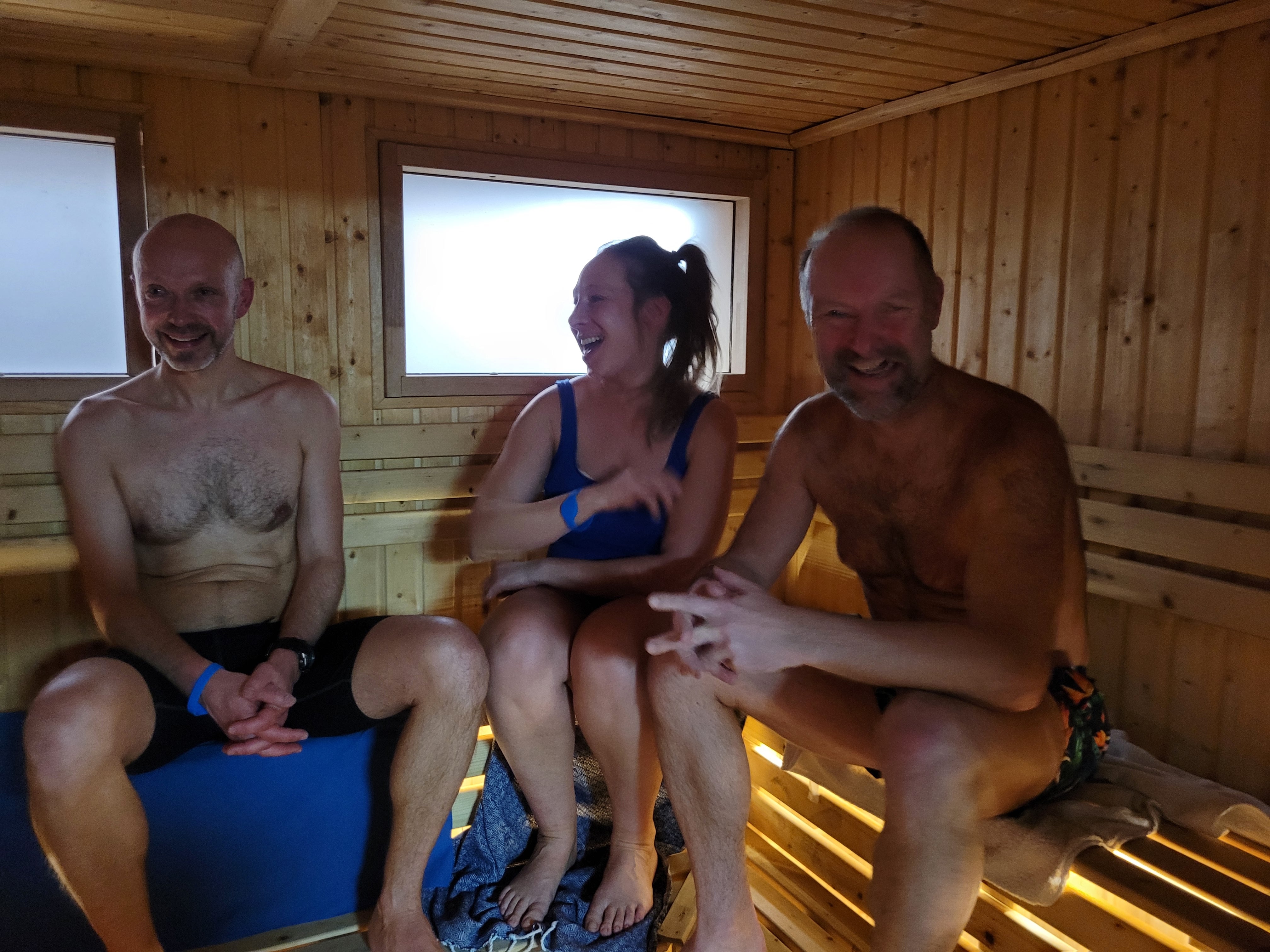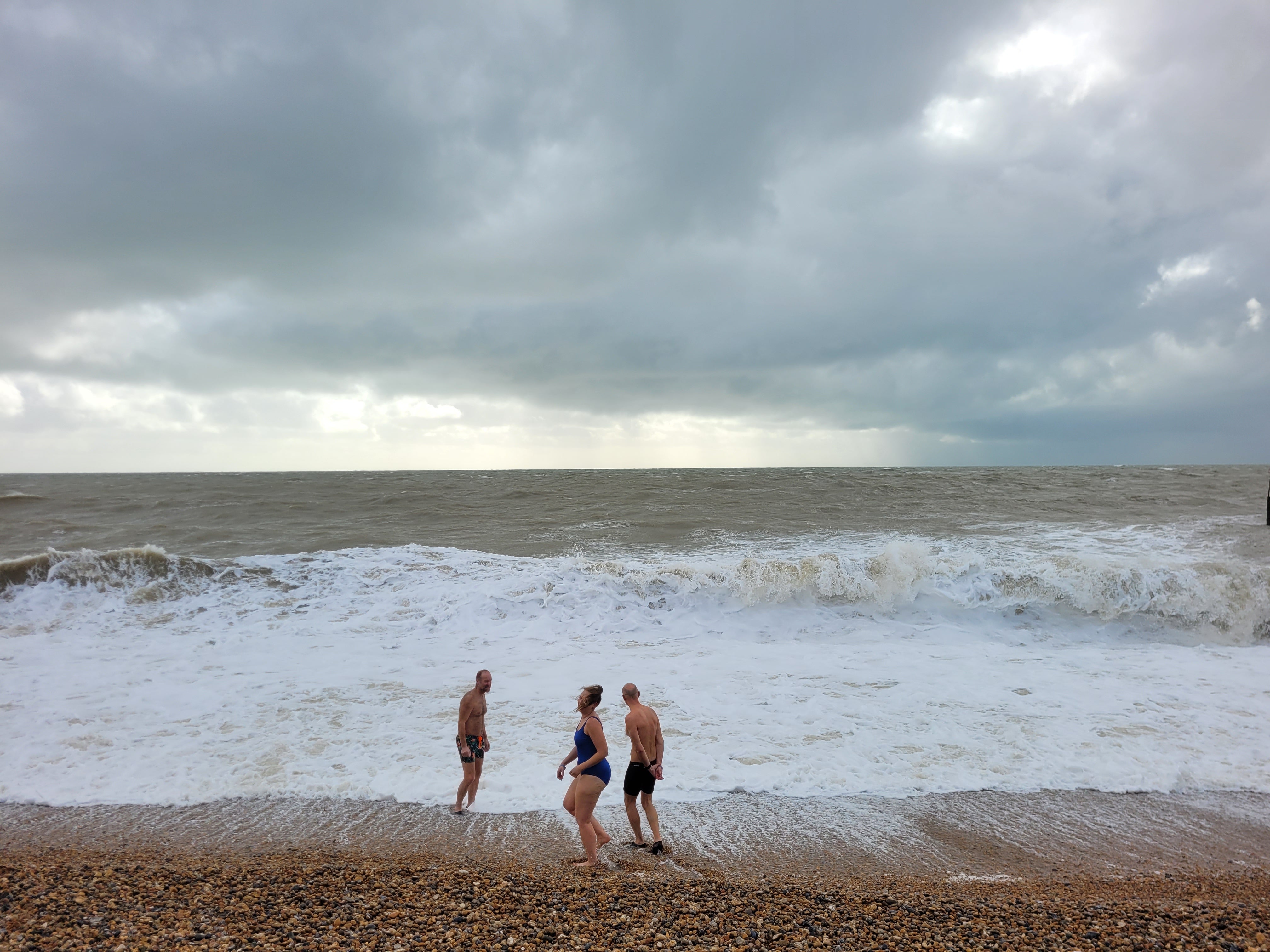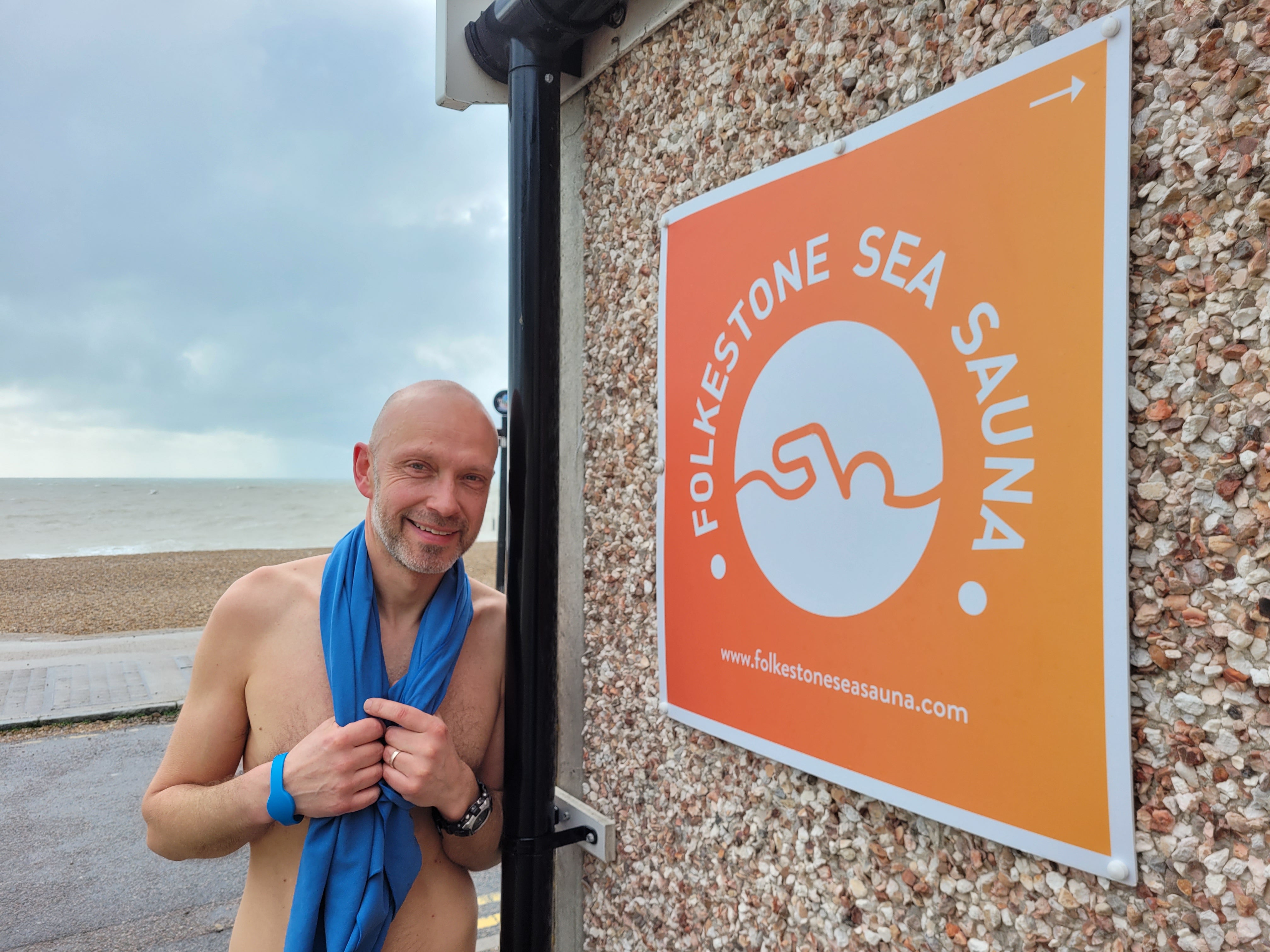The Independent's journalism is supported by our readers. When you purchase through links on our site, we may earn commission.
Heat me happy: How community saunas are helping people heal through trauma
Sitting in a hot, sweaty box might not sound like the key to happiness, but Brits are increasingly finding that this Scandi practice can have a profound impact on their wellbeing that goes far beyond feeling ‘relaxed’. Helen Coffey meets the members of one endeavour that’s quietly but radically changing locals’ lives


I honestly think the sauna saved my life.” Hanna tells me this calmly, without any sense of hyperbole, over coffee at a local café.
In 2020, the 45-year-old graphic designer had what she describes as a “seriously bad” mental breakdown, with bouts of anxiety that would last for up to 12 hours a day. Living in the UK at the time, she found no mental health resources readily available and was eventually forced to return to her home country of Germany to get proper support. While there, she started going to a sauna every day. The result was transformational.
“It was the only place I felt safe for sure – I always knew that, however I felt during the day, there was this place I could come back to, to relearn how to feel safe, to unlearn anxiety. The combination of the extreme heat and cold rush brought me back into my body. I spent every evening in this comforting place for three weeks – and I feel sure that healed me.”
It’s why, when she moved back to Folkestone in Kent and discovered a community sauna was in the works, she joined as soon as she could. “Thankfully I’ve been very well now for two years – but I know that, whatever happens, the sauna is there. My dad died last year, and I knew the sauna was there. If I go through rough patches and the anxiety comes back, I know the sauna is there. I’m quite sure this will be my medicine.”
It’s a feeling that’s shared by nearly every member of Folkestone Sea Sauna’s now 170-strong community that I speak to – myself included. Officially up and running since February 2023, the sauna was something I stumbled upon after moving to this coastal town in the autumn of the previous year.
Looking back, I found it an incredibly testing time. I’d wanted to live by the sea for so long that I never considered what an upheaval moving might be – both practically and emotionally. I had parachuted into a new place where I knew no one and had become a homeowner for the first time, with all the accompanying difficult and expensive problems that entailed. Out every night, I threw myself into social activities in a desperate bid to make new friends, putting on my happiest of happy faces to ensure I made a good first impression. And then I would return, exhausted and depleted, to a house that didn’t feel like home and was in need of work that I had neither the skills nor money to undertake. Wandering blankly from room to room, I’d stare into space and mentally list all the endless jobs required until my brain felt sufficiently broken from being overwhelmed. Then I’d sink to the floor, curl up in a foetal-like ball, and have a little weep.

I’m not normally someone who finds winter particularly tricky, but that winter was different. January was the cruellest month, a sludge-grey, never-ending slog towards I knew not what.
I won’t pretend the sauna solved all my problems overnight. But that first time I visited, I sat in a hot, wooden room with a bunch of sweaty strangers, laughing and connecting as if it were the most natural thing in the world. Strode over the road, down the pebble beach, and plunged into water so cold that it felt like my blood was dancing. Felt the sun’s hazy warmth caressing my cheeks and the waves’ gentle swells like lungs inhaling and exhaling. Heard the sharp, shrill cries of gulls circling overhead in a sky that colour-matched the sea so closely I couldn’t tell where one ended and the other began. And I finally felt… happy again. More than happy, in fact – euphoric.
Katie, a 39-year-old executive assistant who moved to Folkestone in 2020, echoes this sentiment. Having been through a traumatic relationship breakdown, she’d been struggling with anxiety and depression. “The first time I went to the sauna, I sat on a terrace in the sun afterwards, and it was the first time I’d been happy in a very long time,” she recalls. “I’d forgotten how that felt. The more I kept going, the more it gave me the courage to come off antidepressants – it gave me hope that life could be different.”

To the uninitiated, it might seem strange that something as simple as alternating extreme temperatures could have such a profound effect on people’s mental health and wellbeing. But science backs up the sensation many of us have experienced. Numerous studies have found a link between sauna, cold water immersion and improved mood – the hot to cold shift releases endorphins normally associated with cardiovascular exercise. And new research has suggested that using saunas could alleviate depression; a study from the University of California found a correlation between depression and elevated body temperature.
“Ironically, heating people up actually can lead to rebound body temperature lowering that lasts longer than simply cooling people down directly, as through an ice bath,” Dr Ashley Mason, associate professor of psychiatry and the study’s lead author, told Medical News Today. One study showed that decreases in a person’s body temperature in the days after a single heat treatment correlated with decreases in their depression symptoms over that same period.
Using the sauna has definitely helped Sarah, a 50-year-old holiday let manager, through bouts of depression. “I’ve suffered with seasonal affective disorder (SAD) regularly through the winter – in the past, when I could barely get out of bed, the one thing I knew I could do was make it to the sauna.” Frances, 45, a yoga teacher who’s lived in the Folkestone area for 15 years, has also seen the impact on her mental health. “I lost my dad in 2019, was going through a lengthy separation and divorce, and then the pandemic hit – things were really tough. I retreated more into myself. The sauna was the thing that helped me to reconnect with people.” She also stopped drinking two years ago: “The sauna was this new way of getting out and being sociable – it would have been intimidating without alcohol in any other setting. But the sauna was a totally relaxed environment where you could relearn to socialise without it. It’s really special.”
The more I kept going, the more it gave me the courage to come off antidepressants – it gave me hope that life could be different
Having an activity where you can hang out without booze has been a wonderfully unexpected benefit for numerous members. For Carl, a 48-year-old running coach, it goes a step further. Sober for six years, he and his running group of former addicts names using the sauna as a tool in the group’s recovery arsenal. “It’s a buzz, the kind of natural high we’re still chasing! The feeling of going from the sauna to the cold – something about it lights your brain up,” he says.
The other huge bonus Carl has stumbled across has been the community itself. He’s working on a local project to introduce young people in care to outdoor activities including trail running and mountain biking. “I ended up meeting a load of really cool, lovely people at the sauna,” he says. “I told them about what we’re doing, and I’ve had members offering to do yoga sessions and wild swimming coaching and stand up paddleboarding – all for free.”
Unlike many of the other saunas that have been popping up across coastal towns, the Folkestone project is not a commercial enterprise. It’s the completely not-for-profit, volunteer-run brainchild of Peter Blach, a 50-year-old filmmaker and Folkestone local since 2009. The sauna started as little more than a wild and unlikely dream in 2018, inspired by the sauna culture in his native Denmark – where community seaside saunas had grown steadily in number and popularity over the last two decades.

What followed was six years in which this small kernel of an idea was turned into a reality – six years chequered by numerous obstacles that ranged from finding other enthusiasts who were invested enough to form a committee, to raising the £23,000 needed to build the sauna. The most daunting and frustrating element was identifying a permanent location that could feasibly work. Finally, a storage space owned by Folkestone Rowing Club was suggested as a potential home, and the project gathered momentum.
“It wasn’t something that came quickly – it was quite hard when I look back,” says Peter. “There were points when I just thought it wasn’t going to happen. But it’s totally been worth it. Today I feel really proud of our sauna and our community.”
He was never going to run it as a business – “I’m not in it to make money” – but even Peter couldn’t foresee what an impact his community sauna would have. “It’s grown into something I couldn’t have predicted – it’s really powerful,” he says. “There’s something about sitting in the sauna that makes you connect to other people and reach out. You might sit with two or three strangers, and you just start talking because you have this thing in common: how cold the sea was, how good the steam feels. It breaks down barriers.”
Because of being in this close, safe community of like-minded people, I am learning to be comfortable in my own skin
There are other, less immediately obvious positives that underpin what makes a community sauna so special. “I’ve battled with mental health issues for the majority of my life,” says Kat, 34, a senior lecturer. “One offset of that is having quite debilitating body image issues. Before coming to this sauna, the thought of being semi-naked in front of strangers was crippling. Gradually, because of being in this close, safe community of like-minded people, I am learning to be comfortable in my own skin; I’m learning to undress in shared changing rooms, to step into a place of males and females of all different sizes and shapes, and wear a swimming costume.
“To feel that level of acceptance is absolutely transformational.”
What enhances this feeling, perhaps – and the sense of barriers being broken down in general – is that it is one of the few remaining social spaces where phones haven’t permeated. Not only does it mean you’re not constantly battling someone’s device in a bid for their attention, it also means no one is paranoid about being snapped and stuck on Instagram. They can be truly at ease; genuinely vulnerable.
“I do think this will help make the world a better place,” muses Hanna. “Everyone is so scared of not making it in this rough, money-driven world, that people can get super selfish. That’s why it’s so beautiful when no money is involved: everyone just chips in with passion and helps, because they believe in community.”

Sure, from one perspective, it’s just sitting in a hot, wooden room with a bunch of sweaty strangers. But there is clearly something much more profound happening beneath the surface for everyone who is part of this unique community.
As Hanna puts it: “I wish there were more things like this. I genuinely think that would save the world.”
Join our commenting forum
Join thought-provoking conversations, follow other Independent readers and see their replies
Comments
Bookmark popover
Removed from bookmarks